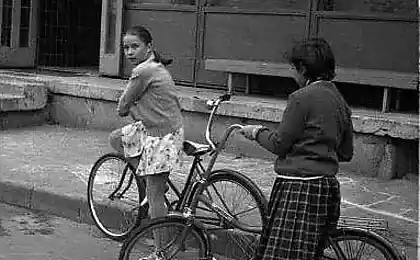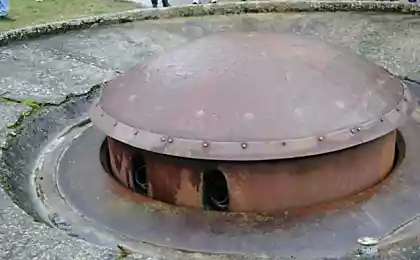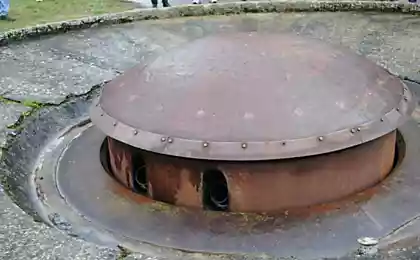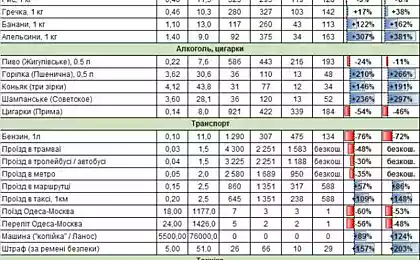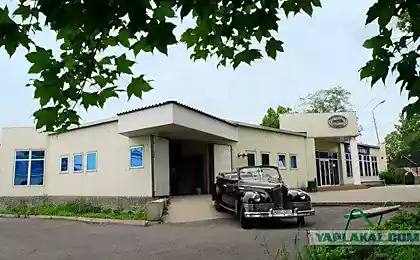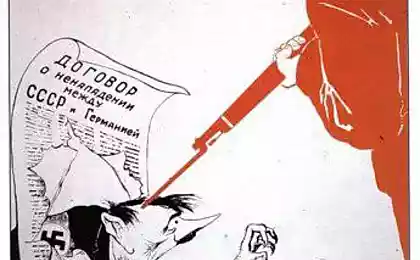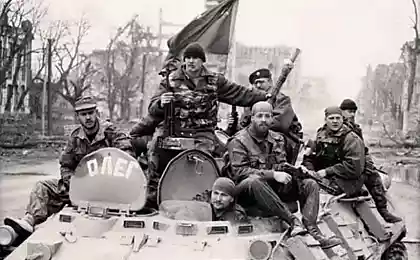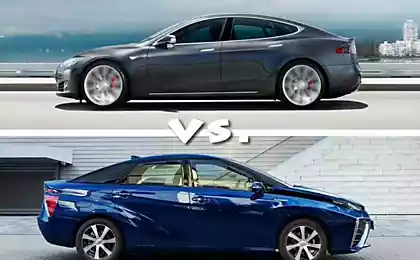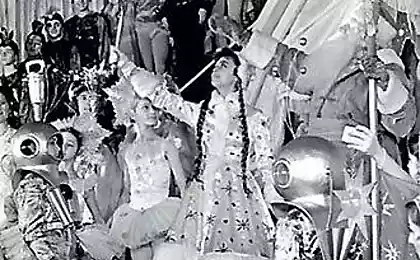1454
Cars in the USSR (24 photos)
In recent years, the territory of the former Soviet Union flooded cars are not made on its open spaces. And it's not bad at all) Reliable and rigorous Germans, the Japanese creative and refined, stylish and powerful Americans, the French and the sickening cheap Chinese ... since come to foreign cars, the Soviet producers are in deep ass! Cayenne and Escalade on the streets of Kiev, Moscow, Minsk and those ne an order of magnitude greater than the Muscovites, Volga or Neve.
But what they were vehicles of the USSR? And how would we see them today, without the Internet and digital photography? ..
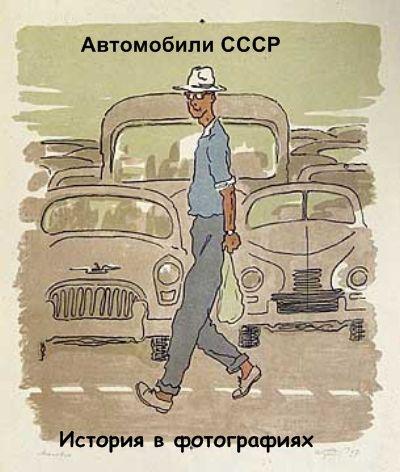
Ryabushinskys In 1916, a contract was signed with the tsarist government to build a car factory in Moscow and the production of trucks for the needs of the Imperial Army. The base model of the car was chosen Fiat 15 Ter development of 1912, well in off-road conditions in the colonial wars of Italy. The factory was founded called the Moscow Automobile Company (AMO). Before the revolution, managed to gather nearly a thousand cars from the ready-made kits to create their production capacity failed.
In the early 1920s, the Council of Labor and Defense has allocated funds for the establishment of a lorry. For the sample was selected is the same Fiat. There are two reference copies and partial documentation.
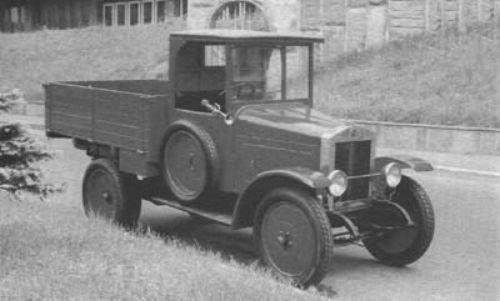
Automotive Soviet Union launched November 7, 1924 in Moscow the day saw the first cars of the first automobile plant in the country. They walked through Red Square during a parade in October - Ten red truck AMO-F15, which were manufactured in the factory, whose brand today known to all as the ZIL.
F-15 produced a capacity of 35 hp and volume 4, 4 liters.
A year later, in Yaroslavl were collected first domestic 3-ton trucks, and in 1928 the first four-and pyatitonniki ...
but we will talk about Soviet cars
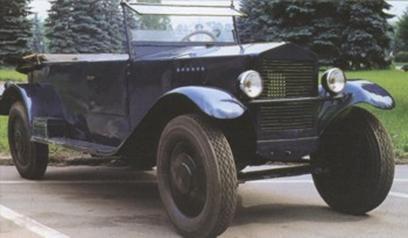
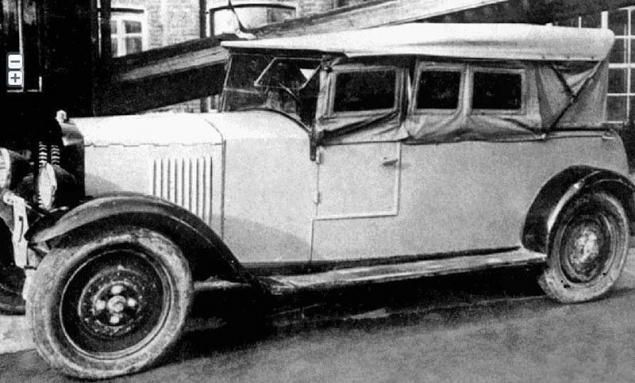
US-1 (1927-1932), the maximum speed of 70 km / h, capacity 20 liters. a.
The first production car of Soviet Russia, released about 370 copies.
The special features of US-1 treated spinal frame - tube diameter 135 mm, air-cooled engine, the absence of differential, which in combination with the ground clearance of 225 mm ensures good flotation, but influenced the increased tire wear. In the US there was no-one devices, and the body had at one door for each row of seats.
Plant "Spartacus" - a former vehicle-factory Il'ina where deployed release, did not have the equipment and experience to the full car production. In particular, therefore, the reliability of US-1 caused a lot narekaniy.V 1929 car upgraded: high-revving engine, set the speedometer and transmission production plans elektrostarter.Suschestvovali US-1 at the Izhora factory in Leningrad. However, it never did, and in October, 1930 issue of US-1 stopped.
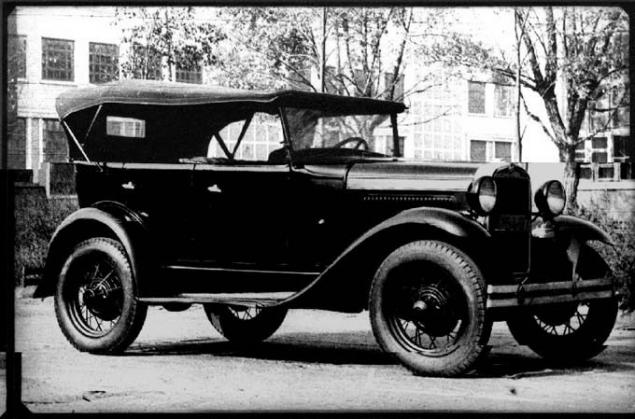
Passenger car GAZ-A was made according to the drawings of the American company "Ford" (1932-1936). Despite this, he was somewhat different from the American prototype: the Russian version were reinforced clutch and steering.
The maximum speed of 90 km / h, the power of 40 hp
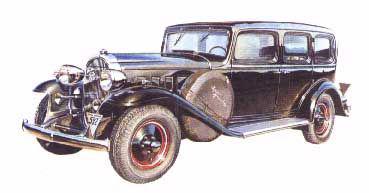
Passenger car A-1 (1933-1934), the maximum speed of 115 km / h, 105 hp
Factory "Red Putilovets" (1934 Kirovsky Plant) by 1932 ceased production of obsolete wheeled tractors "Fordson Putilovets" and a group of specialists of the plant put forward the idea to organize the issue of executive cars.
The prototype car was named "Leningrad-1" (or "L-1") was an American "Buick-32-90" 1932
It was a rather sophisticated and complex (5450 pieces) machine.
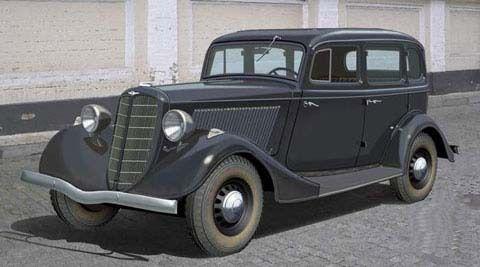
Passenger car GAZ-M-1 (1936-1940), the maximum speed of 100 km / h, 50 hp
On the basis of GAZ-M1 produced modification "taxi" and "pick-ups" GAZ-415 (1939-1941.). A total ease with the conveyor descended 62,888 cars GAZ-M1, and has survived to the present time a few hundred. Chassis etoy- model is exhibited in the automotive department of the Polytechnic Museum in Moscow.
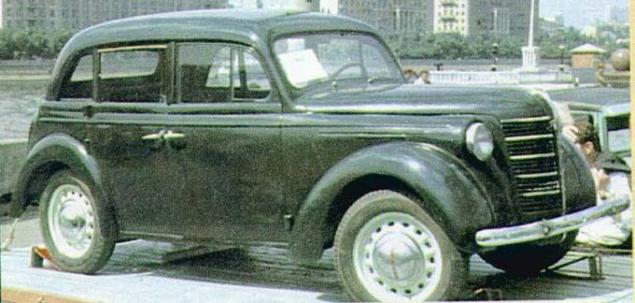
CMM-10 - the first Soviet serial subcompact car.
1940-41 years, the maximum speed of 90 km / h, the power of 26 hp
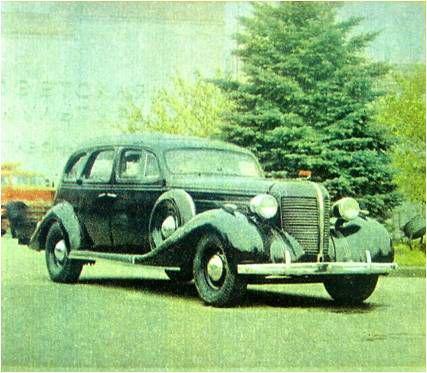
Passenger car ZIS-101.
1936-1941 year, the maximum speed of 120 km / h, 110 hp
This model features many technical solutions, not previously encountered in the practice of the domestic automotive industry. Among them: a dual carburetor, the thermostat in the cooling system, vibration damper on the crankshaft of the engine, the synchronizers in the gearbox, the heater body and the radio.
The machine had dependent spring suspension of all wheels, spar frame, the brake servo, located in the cylinder head valves are driven by a sucker rod. After upgrading (in 1940) she received index ZIS- 101A.
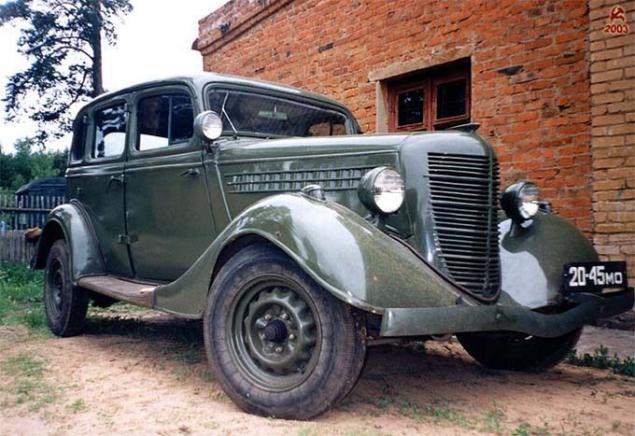
Passenger car GAZ-11-73.
1940-1948 year, the maximum speed of 120 km / h, the power of 76 hp
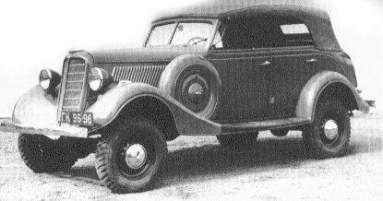
Passenger car GAZ-61 (1941-1948)
The maximum speed of 100 km / h, the power of 85 hp
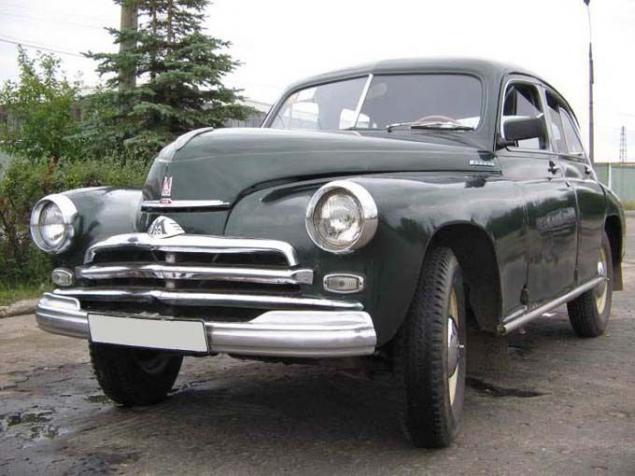
Passenger car GAZ M-20 wins (1946-1958)
The maximum speed of 105 km / h, the power of 52 hp
Unique car Soviet automobile industry.
GAZ-M20 prototype appeared in 1944. By design kuzo-front suspension the car was very similar to "Opel Captain", but overall looked fresh and original, has been particularly evident on the first post-war years, when Gorky began mass production of "victory" and ve¬duschie European firms We revived the issue of pre-war models. In prototypes of GAZ M20 Pobeda was used-cylinder engine in the series in 1946 with the launch vehicle "obrezan¬nym" two cylinder unit.
In 1948, due to design flaws (the car is parked on a conveyor in a terrible hurry) assembly priostanovi¬li and resumed in the autumn of 1949. Since then, the car had a reputation for strong, reliable, unpretentious. Until 1955 ver¬siyu built with 50 horsepower, then variant M20 - moderni¬zirovanny, particularly with forced 2 hp motor. In small quantities for special services produced GAZ-M20 F with 90-horsepower 6-cylinder engine. In 1949-1954 rm. built 14,222 Convertible - now the rarest modification. Total until May of 1958 produced 235 999 "victories».
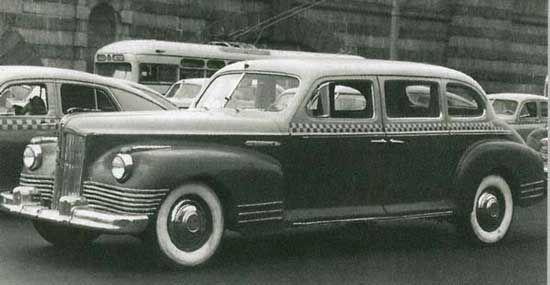
"ZIS-110" (1946-1958), the maximum speed of 140 km / h, the power of 140 hp
ZIS-110, "Executive" comfortable limousine, really is the design, which took into account all the latest achievements at the time of motor vehicles. This is the first innovation that our industry has mastered the first year of peace. Designing machines began in 1943, still during the war, September 20, 1944 were approved by the Government of the samples of the car, and a year later, in August 1945, was already assembling the first batch. For 10 months - unheard of a short time - the plant has fulfilled the necessary drawings, developed the technology, has prepared the necessary tooling and equipment. Just remember that when the plant in 1936, mastered the production of cars ZIS-101, the preparation for their production took almost a year and a half. Thus it is necessary to take into account that all the most complex tooling - dies for the manufacture of body parts, the longitudinal frame members, jigs for welding of the body - were obtained from the United States. For the ZIS-110 all produced on its own.
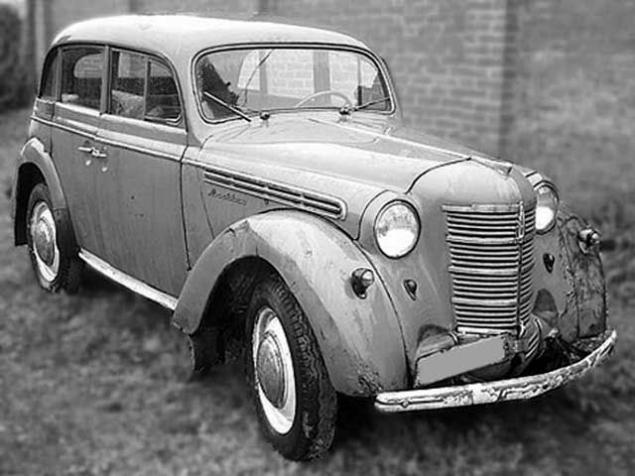
"Moskvich-401" (1954-1956), the maximum speed of 90 km / h, the power of 26 hp
Moskvich-401 is really not even a copy and pure Opel Kadett K38 sample of 1938, except for the door.
Some believe that the stamps on the rear doors have been lost during transportation from Rüsselsheim, were made anew. But K38 was produced and a 2-door, so it is possible that the seals were removed this variant of the car.
The commander of the American occupation zone did not take the money brought by the Soviet delegation, and ordered to pay all the necessary Russian factory Opel. December 4, 1946 was assembled the first Moskvich.
Indices 400 and 401 - the factory engine designations. The rest of the body indicate the model 420 - a sedan, 420A - convertible. In 1954 there was a more powerful engine model - 401. And the most recent Moskvich-401 equipped with new motors Moskvitch 402.
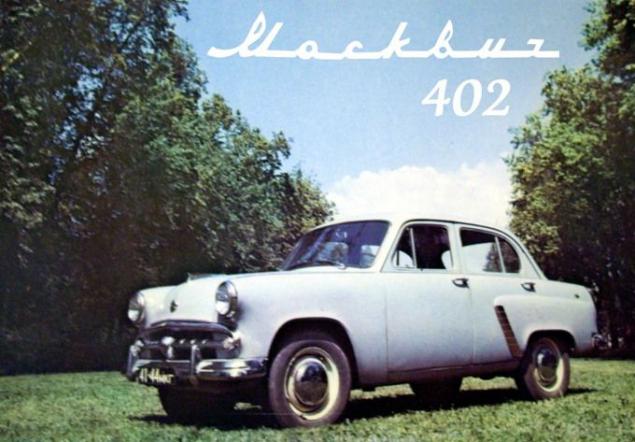
Passenger car Moskvich-402 (1956-1958), the maximum speed of 105 km / h and a power of 35 hp
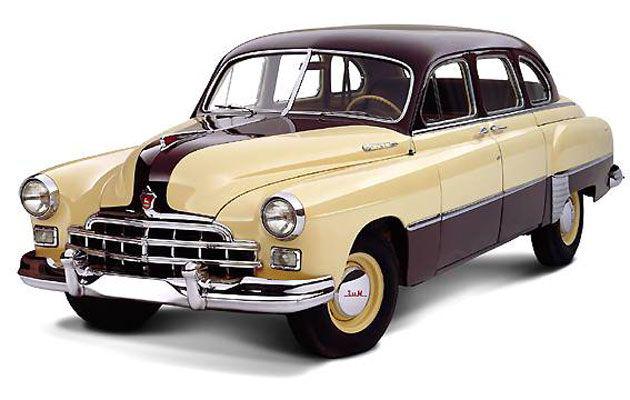
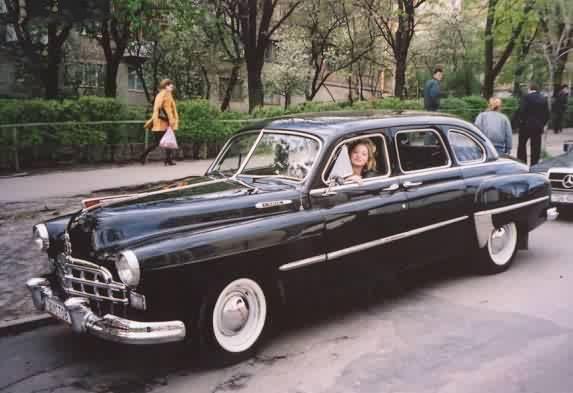
"GAZ-M-12 ZIM" (1950-1959), the maximum speed of 120 km / h, 90 hp
Engine. Basically it is a six-cylinder engine GAZ-11, the design of which Gorky began in 1937. Its release is launched in 1940, and it was used on cars GAZ-11-73 and GAZ-61, as well as light tanks and self-propelled guns of the Great Patriotic War and truck GAZ-51.
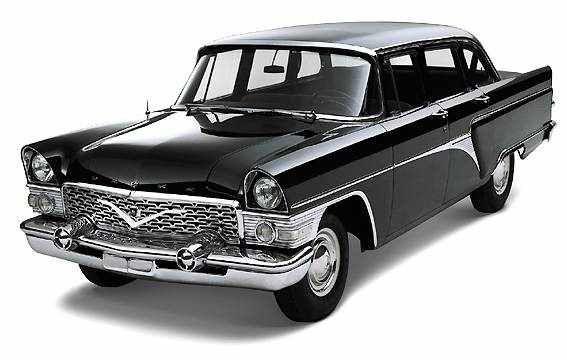
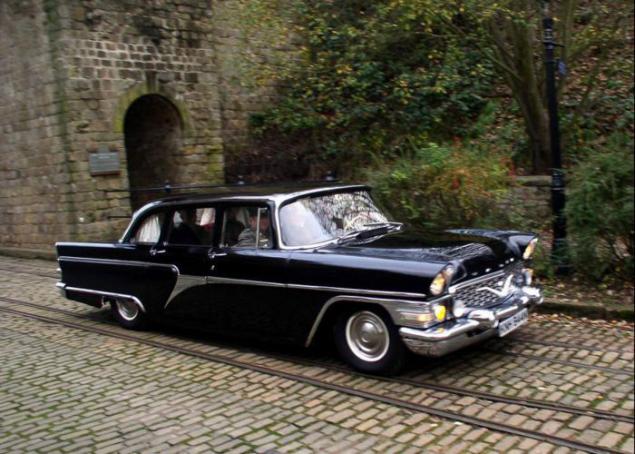
"GAZ-13 Chaika" (1959-1975), the maximum speed of 160 km / h and 195 l capacity. a.
Soviet dream car, made in the image of Detroit Baroque.
"The Seagull" was equipped with a V-5, 5-liter engine, X-shaped frame, an automatic transmission (!!! 1959 in the yard), the salon has 7 seats. 195 l. from. Under the hood, good acceleration, moderate consumption of - what else is needed for full happiness? But to say it's all about "The Seagull" is to say nothing.
"The Seagull" appeared in 1959, in the very midst of the Khrushchev thaw. After dark "ZIS" and humorless "winter" it is surprisingly humane, if not feminine face. However, a person is created in other regions: for the design of the GAZ-13 was a shameless copy of the last of the family Packard - Patrician models and the Caribbean. And not the first copy of the first with the Packard made ZIL-111 for members of the Politburo, and only later decided to make the limousine easier to replace the "winters».
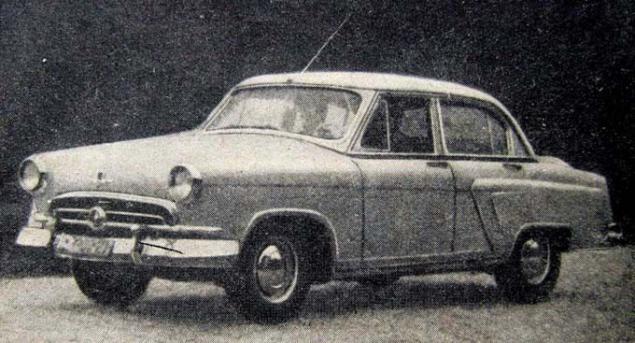
"GAZ Volga 21P" (1965-1970), the maximum speed of 130 km / h, 75 hp
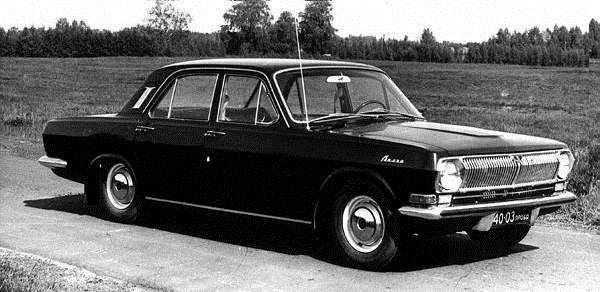
"GAZ-24 Volga" (1968-1975), the maximum speed of 145 km / h, 95 hp
"Volga GAZ-24", which has stood on the conveyor 15 July 1970, creating as many as 6 years. Come up with a new car is not easy, but the Soviet avtomobilestroiteli- "sixties" knew the way. And when we received the order to prepare the replacement of a beautiful but too old "Volga GAZ-21" did not suffer doubts and pangs. They took three overseas car - «Ford Falcon», «Plymouth Valiant», «Buick Special» 60-61 years - and, armed with an adjustable wrench, screwdrivers and other tools for analysis began to learn from the experience.
As a result, "24th" was a real revelation road (compared to its predecessor "21R"). Judge for yourself: the size reduced, and the wheelbase has increased, the width remains the same, but became more spacious interior and trunk and did great. In general, a typical case of "inside than outside».
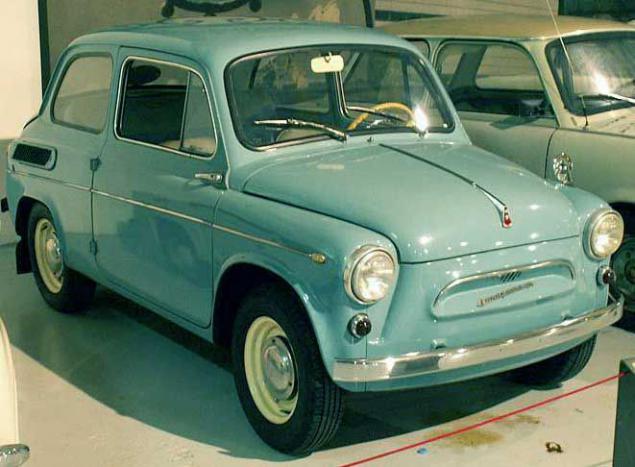
"Zaporozhets ZAZ-965A" (1963-1969), the maximum speed of 90 km / h, the power of 27 hp
November 22, 1960 the first batch of brand-new cars, get a serial name "ZAZ-965" went to happy customers. Which soon formed a huge queue, because the price of the "Zaporozhets" was set very reasonable - about 1200 rubles. Then it was about the annual average salary.
Strange as it may seem now, but then "ZAZ-965" was more popular among intellectuals than among workers or farmers. The reason for this is largely become too tiny trunk, which was impossible to load the bags of vegetables. The problem is only permitted creating the grill pan, strengthens the roof of the car, which immediately began to load the half a ton of potatoes, the whole haystack, why "Zaporozhets" resembled Asian donkeys.
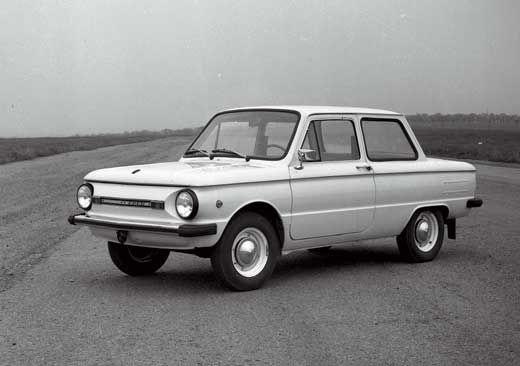
Zaporozhets ZAZ-968, the maximum speed of 120 km / h, the power of 45 hp
ZAZ-968 produced from 1972 to 1980. It had features such as an improved engine MeMZ-968 with increased up to 1, 2 liters. working volume, with its power increased to 31 kW (42 hp).
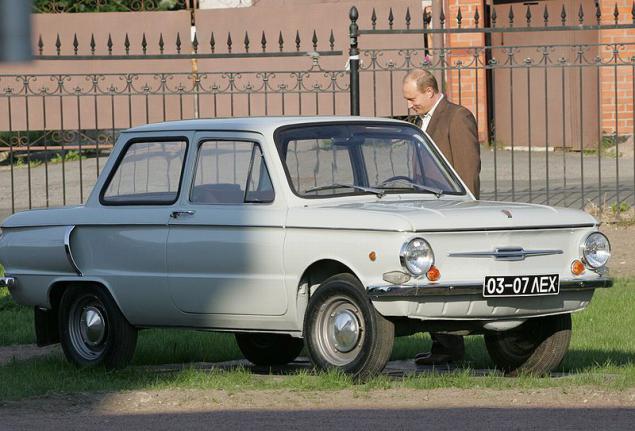
Zaporozhets Vladimir Putin.
But what they were vehicles of the USSR? And how would we see them today, without the Internet and digital photography? ..

Ryabushinskys In 1916, a contract was signed with the tsarist government to build a car factory in Moscow and the production of trucks for the needs of the Imperial Army. The base model of the car was chosen Fiat 15 Ter development of 1912, well in off-road conditions in the colonial wars of Italy. The factory was founded called the Moscow Automobile Company (AMO). Before the revolution, managed to gather nearly a thousand cars from the ready-made kits to create their production capacity failed.
In the early 1920s, the Council of Labor and Defense has allocated funds for the establishment of a lorry. For the sample was selected is the same Fiat. There are two reference copies and partial documentation.

Automotive Soviet Union launched November 7, 1924 in Moscow the day saw the first cars of the first automobile plant in the country. They walked through Red Square during a parade in October - Ten red truck AMO-F15, which were manufactured in the factory, whose brand today known to all as the ZIL.
F-15 produced a capacity of 35 hp and volume 4, 4 liters.
A year later, in Yaroslavl were collected first domestic 3-ton trucks, and in 1928 the first four-and pyatitonniki ...
but we will talk about Soviet cars


US-1 (1927-1932), the maximum speed of 70 km / h, capacity 20 liters. a.
The first production car of Soviet Russia, released about 370 copies.
The special features of US-1 treated spinal frame - tube diameter 135 mm, air-cooled engine, the absence of differential, which in combination with the ground clearance of 225 mm ensures good flotation, but influenced the increased tire wear. In the US there was no-one devices, and the body had at one door for each row of seats.
Plant "Spartacus" - a former vehicle-factory Il'ina where deployed release, did not have the equipment and experience to the full car production. In particular, therefore, the reliability of US-1 caused a lot narekaniy.V 1929 car upgraded: high-revving engine, set the speedometer and transmission production plans elektrostarter.Suschestvovali US-1 at the Izhora factory in Leningrad. However, it never did, and in October, 1930 issue of US-1 stopped.

Passenger car GAZ-A was made according to the drawings of the American company "Ford" (1932-1936). Despite this, he was somewhat different from the American prototype: the Russian version were reinforced clutch and steering.
The maximum speed of 90 km / h, the power of 40 hp

Passenger car A-1 (1933-1934), the maximum speed of 115 km / h, 105 hp
Factory "Red Putilovets" (1934 Kirovsky Plant) by 1932 ceased production of obsolete wheeled tractors "Fordson Putilovets" and a group of specialists of the plant put forward the idea to organize the issue of executive cars.
The prototype car was named "Leningrad-1" (or "L-1") was an American "Buick-32-90" 1932
It was a rather sophisticated and complex (5450 pieces) machine.

Passenger car GAZ-M-1 (1936-1940), the maximum speed of 100 km / h, 50 hp
On the basis of GAZ-M1 produced modification "taxi" and "pick-ups" GAZ-415 (1939-1941.). A total ease with the conveyor descended 62,888 cars GAZ-M1, and has survived to the present time a few hundred. Chassis etoy- model is exhibited in the automotive department of the Polytechnic Museum in Moscow.

CMM-10 - the first Soviet serial subcompact car.
1940-41 years, the maximum speed of 90 km / h, the power of 26 hp

Passenger car ZIS-101.
1936-1941 year, the maximum speed of 120 km / h, 110 hp
This model features many technical solutions, not previously encountered in the practice of the domestic automotive industry. Among them: a dual carburetor, the thermostat in the cooling system, vibration damper on the crankshaft of the engine, the synchronizers in the gearbox, the heater body and the radio.
The machine had dependent spring suspension of all wheels, spar frame, the brake servo, located in the cylinder head valves are driven by a sucker rod. After upgrading (in 1940) she received index ZIS- 101A.

Passenger car GAZ-11-73.
1940-1948 year, the maximum speed of 120 km / h, the power of 76 hp

Passenger car GAZ-61 (1941-1948)
The maximum speed of 100 km / h, the power of 85 hp

Passenger car GAZ M-20 wins (1946-1958)
The maximum speed of 105 km / h, the power of 52 hp
Unique car Soviet automobile industry.
GAZ-M20 prototype appeared in 1944. By design kuzo-front suspension the car was very similar to "Opel Captain", but overall looked fresh and original, has been particularly evident on the first post-war years, when Gorky began mass production of "victory" and ve¬duschie European firms We revived the issue of pre-war models. In prototypes of GAZ M20 Pobeda was used-cylinder engine in the series in 1946 with the launch vehicle "obrezan¬nym" two cylinder unit.
In 1948, due to design flaws (the car is parked on a conveyor in a terrible hurry) assembly priostanovi¬li and resumed in the autumn of 1949. Since then, the car had a reputation for strong, reliable, unpretentious. Until 1955 ver¬siyu built with 50 horsepower, then variant M20 - moderni¬zirovanny, particularly with forced 2 hp motor. In small quantities for special services produced GAZ-M20 F with 90-horsepower 6-cylinder engine. In 1949-1954 rm. built 14,222 Convertible - now the rarest modification. Total until May of 1958 produced 235 999 "victories».

"ZIS-110" (1946-1958), the maximum speed of 140 km / h, the power of 140 hp
ZIS-110, "Executive" comfortable limousine, really is the design, which took into account all the latest achievements at the time of motor vehicles. This is the first innovation that our industry has mastered the first year of peace. Designing machines began in 1943, still during the war, September 20, 1944 were approved by the Government of the samples of the car, and a year later, in August 1945, was already assembling the first batch. For 10 months - unheard of a short time - the plant has fulfilled the necessary drawings, developed the technology, has prepared the necessary tooling and equipment. Just remember that when the plant in 1936, mastered the production of cars ZIS-101, the preparation for their production took almost a year and a half. Thus it is necessary to take into account that all the most complex tooling - dies for the manufacture of body parts, the longitudinal frame members, jigs for welding of the body - were obtained from the United States. For the ZIS-110 all produced on its own.

"Moskvich-401" (1954-1956), the maximum speed of 90 km / h, the power of 26 hp
Moskvich-401 is really not even a copy and pure Opel Kadett K38 sample of 1938, except for the door.
Some believe that the stamps on the rear doors have been lost during transportation from Rüsselsheim, were made anew. But K38 was produced and a 2-door, so it is possible that the seals were removed this variant of the car.
The commander of the American occupation zone did not take the money brought by the Soviet delegation, and ordered to pay all the necessary Russian factory Opel. December 4, 1946 was assembled the first Moskvich.
Indices 400 and 401 - the factory engine designations. The rest of the body indicate the model 420 - a sedan, 420A - convertible. In 1954 there was a more powerful engine model - 401. And the most recent Moskvich-401 equipped with new motors Moskvitch 402.

Passenger car Moskvich-402 (1956-1958), the maximum speed of 105 km / h and a power of 35 hp


"GAZ-M-12 ZIM" (1950-1959), the maximum speed of 120 km / h, 90 hp
Engine. Basically it is a six-cylinder engine GAZ-11, the design of which Gorky began in 1937. Its release is launched in 1940, and it was used on cars GAZ-11-73 and GAZ-61, as well as light tanks and self-propelled guns of the Great Patriotic War and truck GAZ-51.


"GAZ-13 Chaika" (1959-1975), the maximum speed of 160 km / h and 195 l capacity. a.
Soviet dream car, made in the image of Detroit Baroque.
"The Seagull" was equipped with a V-5, 5-liter engine, X-shaped frame, an automatic transmission (!!! 1959 in the yard), the salon has 7 seats. 195 l. from. Under the hood, good acceleration, moderate consumption of - what else is needed for full happiness? But to say it's all about "The Seagull" is to say nothing.
"The Seagull" appeared in 1959, in the very midst of the Khrushchev thaw. After dark "ZIS" and humorless "winter" it is surprisingly humane, if not feminine face. However, a person is created in other regions: for the design of the GAZ-13 was a shameless copy of the last of the family Packard - Patrician models and the Caribbean. And not the first copy of the first with the Packard made ZIL-111 for members of the Politburo, and only later decided to make the limousine easier to replace the "winters».

"GAZ Volga 21P" (1965-1970), the maximum speed of 130 km / h, 75 hp

"GAZ-24 Volga" (1968-1975), the maximum speed of 145 km / h, 95 hp
"Volga GAZ-24", which has stood on the conveyor 15 July 1970, creating as many as 6 years. Come up with a new car is not easy, but the Soviet avtomobilestroiteli- "sixties" knew the way. And when we received the order to prepare the replacement of a beautiful but too old "Volga GAZ-21" did not suffer doubts and pangs. They took three overseas car - «Ford Falcon», «Plymouth Valiant», «Buick Special» 60-61 years - and, armed with an adjustable wrench, screwdrivers and other tools for analysis began to learn from the experience.
As a result, "24th" was a real revelation road (compared to its predecessor "21R"). Judge for yourself: the size reduced, and the wheelbase has increased, the width remains the same, but became more spacious interior and trunk and did great. In general, a typical case of "inside than outside».

"Zaporozhets ZAZ-965A" (1963-1969), the maximum speed of 90 km / h, the power of 27 hp
November 22, 1960 the first batch of brand-new cars, get a serial name "ZAZ-965" went to happy customers. Which soon formed a huge queue, because the price of the "Zaporozhets" was set very reasonable - about 1200 rubles. Then it was about the annual average salary.
Strange as it may seem now, but then "ZAZ-965" was more popular among intellectuals than among workers or farmers. The reason for this is largely become too tiny trunk, which was impossible to load the bags of vegetables. The problem is only permitted creating the grill pan, strengthens the roof of the car, which immediately began to load the half a ton of potatoes, the whole haystack, why "Zaporozhets" resembled Asian donkeys.

Zaporozhets ZAZ-968, the maximum speed of 120 km / h, the power of 45 hp
ZAZ-968 produced from 1972 to 1980. It had features such as an improved engine MeMZ-968 with increased up to 1, 2 liters. working volume, with its power increased to 31 kW (42 hp).

Zaporozhets Vladimir Putin.
